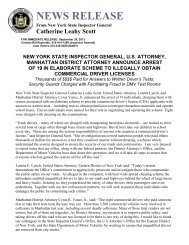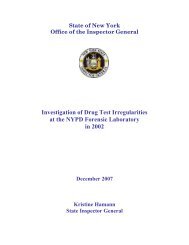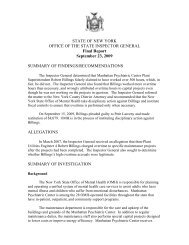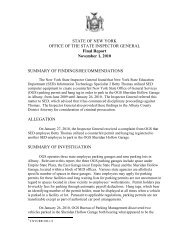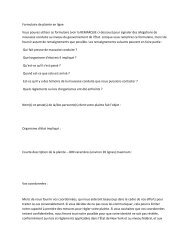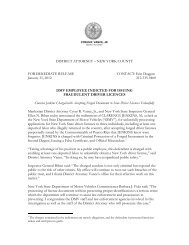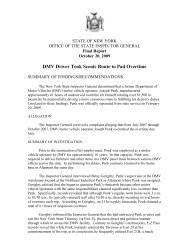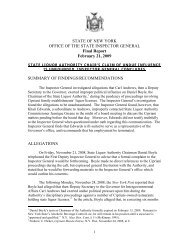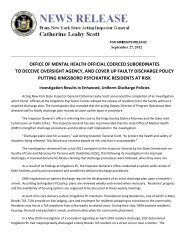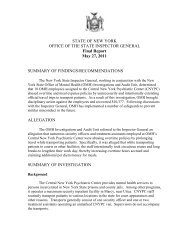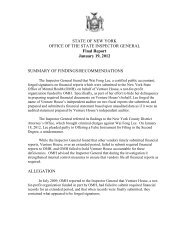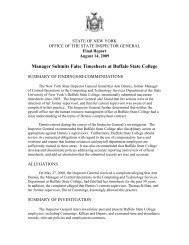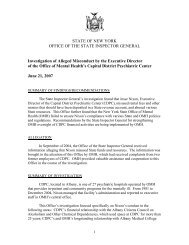- Page 2 and 3:
Pursuant to Executive Law § 53, th
- Page 4 and 5: INVESTIGATION BY THE TACONIC REGION
- Page 6 and 7: The alleged abuse began in Septembe
- Page 8 and 9: Michael and Lisa Carey. Along with
- Page 10 and 11: The Careys filed a complaint with t
- Page 12 and 13: The Taconic Regional Office’s Inv
- Page 14 and 15: egulatory violations identified in
- Page 16 and 17: compared to consumers in state-oper
- Page 18 and 19: determined that Jonathan’s treatm
- Page 20 and 21: Statements from CQC executives and
- Page 22 and 23: investigating agencies or the Gover
- Page 24 and 25: 7. There is no justification for a
- Page 26 and 27: Legislative RecommendationThe Inspe
- Page 28 and 29: and give positive reinforcement for
- Page 30 and 31: separate reports. Taconic’s was i
- Page 32 and 33: 4. Did the investigating agencies e
- Page 34 and 35: in the Department of Special Educat
- Page 36 and 37: III. BackgroundNEW YORK STATE SERVI
- Page 38 and 39: abuse or maltreatment within New Yo
- Page 40 and 41: certain OMRDD-certified facilities,
- Page 42 and 43: instances in which the Anderson Sch
- Page 44 and 45: appropriateness of the Dutchess Cou
- Page 46 and 47: Diagram of the Anderson School camp
- Page 48 and 49: Additionally, the Mental Hygiene La
- Page 50 and 51: Among the protections offered in th
- Page 52 and 53: To ensure the safety of the residen
- Page 56 and 57: esident’s physical condition, inc
- Page 58 and 59: He could also become physically agg
- Page 60 and 61: RESIDENCY AT THE ANDERSON SCHOOLIn
- Page 62 and 63: Shortly after his admission, Jonath
- Page 64 and 65: a snack such as cereal or verbal pr
- Page 66 and 67: weekend, his behavior was so bad, s
- Page 68 and 69: Experts retained by the Inspector G
- Page 70 and 71: The October 9, 2004, Anderson Schoo
- Page 72 and 73: eally losing it, going bananas basi
- Page 74 and 75: document indicated that Jonathan at
- Page 76 and 77: notified and she consented to the m
- Page 78 and 79: The Anderson School Executive Direc
- Page 80 and 81: naked to prevent him from leaving t
- Page 82 and 83: Anderson School Weekly Body Check F
- Page 84 and 85: continues. Does he take a multivita
- Page 86 and 87: Executive Director stated that arou
- Page 88 and 89: OMRDD regulations, OMRDD called the
- Page 90 and 91: CQC investigator’s notes reflecte
- Page 92 and 93: the psychiatrist wrote (in part),
- Page 94 and 95: V. State Agency Investigations of A
- Page 96 and 97: On October 25, 2004, the Careys att
- Page 98 and 99: INVESTIGATION BY THE TACONIC REGION
- Page 100 and 101: are responsible for conducting thei
- Page 102 and 103: School policies and procedures. Inv
- Page 104 and 105:
Taconic Regional Office’s Finding
- Page 106 and 107:
an entry on an October 4, 2004, Beh
- Page 108 and 109:
When questioned about the Taconic r
- Page 110 and 111:
involved “fully in the program pl
- Page 112 and 113:
What were the employees doing that
- Page 114 and 115:
Central Office. Although the Anders
- Page 116 and 117:
acknowledged there was a “propose
- Page 118 and 119:
Taconic Regional Office’s Letter
- Page 120 and 121:
it is not his office’s policy to
- Page 122 and 123:
SURVEY BY THE OMRDD CENTRAL OFFICEA
- Page 124 and 125:
additional information was availabl
- Page 126 and 127:
his supervisor at the time, then-Ar
- Page 128 and 129:
that is absent from the Statement o
- Page 130 and 131:
clinical director role, psychiatris
- Page 132 and 133:
the table contingent on appropriate
- Page 134 and 135:
Former Regional Director Articola s
- Page 136 and 137:
BruisingAlthough the Careys noted t
- Page 138 and 139:
Seclusion / unauthorized time-out /
- Page 140 and 141:
monitoring or supervision by clinic
- Page 142 and 143:
Investigation of complaint by an in
- Page 144 and 145:
and included supporting documentati
- Page 146 and 147:
think they wanted him to have the r
- Page 148 and 149:
Inaccurate Information Provided to
- Page 150 and 151:
this allegation. The letter was tra
- Page 152 and 153:
While reports indicated that the An
- Page 154 and 155:
facilities like the Anderson School
- Page 156 and 157:
egistry, and then it seems there wa
- Page 158 and 159:
INVESTIGATION BY THE NEW YORK STATE
- Page 160 and 161:
target(s) of the complaint engaged
- Page 162 and 163:
arely used by CQC to substantiate a
- Page 164 and 165:
The second paragraph of the case su
- Page 166 and 167:
CQC Director of Quality Assurance a
- Page 168 and 169:
primarily to the provision of meals
- Page 170 and 171:
interview notes would have been exp
- Page 172 and 173:
Jonathan’s “demeanor has change
- Page 174 and 175:
that the additional complaints of a
- Page 176 and 177:
and aggressive behavior related to
- Page 178 and 179:
systemic significance.” In a hear
- Page 180 and 181:
• Anderson School did not have co
- Page 182 and 183:
Jonathan’s casein-free diet, that
- Page 184 and 185:
treatment review to the Careys, the
- Page 186 and 187:
Documentation of investigatory acti
- Page 188 and 189:
As noted above, Bowser also failed
- Page 190 and 191:
did not do a full care and treatmen
- Page 192 and 193:
CQC’s progress notes indicate tha
- Page 194 and 195:
epeatedly attempted to exaggerate t
- Page 196 and 197:
focuses. “We did it at the same t
- Page 198 and 199:
ead, “If he wets again - take she
- Page 200 and 201:
Although the statement provided to
- Page 202 and 203:
The oversight deficiencies were eve
- Page 204 and 205:
that OCFS’s rate of indication is
- Page 206 and 207:
In the following sections the Inspe
- Page 208 and 209:
On at least one previous occasion,
- Page 210 and 211:
emotional injury was impossible in
- Page 212 and 213:
facility employee and CQC recommend
- Page 214 and 215:
Restrictive Statutory LanguageAltho
- Page 216 and 217:
ecognizes that the determination of
- Page 218 and 219:
CQC policy does not require further
- Page 220 and 221:
CQC wrote in its unfounded notifica
- Page 222 and 223:
INVESTIGATION BY THE NEW YORK STATE
- Page 224 and 225:
develop sufficient evidence to supp
- Page 226 and 227:
There is not proper and safe oversi
- Page 228 and 229:
the meeting, “We left it with the
- Page 230 and 231:
this important matter. Your corresp
- Page 232 and 233:
VI. RECOMMENDATIONSThe Inspector Ge
- Page 234 and 235:
ehavior management (14 NYCRR § 633
- Page 236 and 237:
child in an institutional setting,
- Page 238 and 239:
(a) Records and documents pertainin
- Page 240 and 241:
(ii) violent behavior exhibited by
- Page 242 and 243:
8. Such commissioners shall provide
- Page 244 and 245:
plan of prevention and remediation
- Page 246 and 247:
the commission as to the implementa
- Page 248 and 249:
Agency Responses to the Inspector G
- Page 250 and 251:
incident is reported to have occurr
- Page 252 and 253:
Page 2Joseph FischJune 5, 2008conta
- Page 254 and 255:
Recommendations: The Inspector Gene



